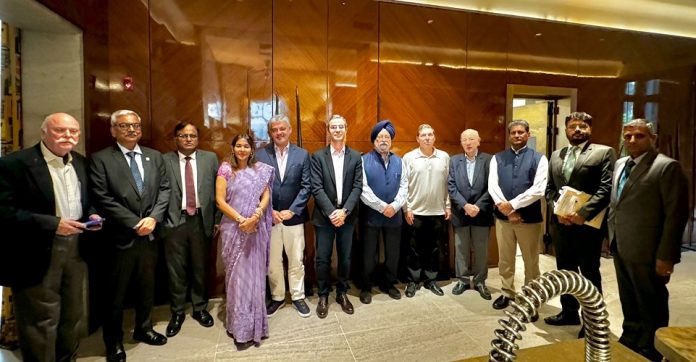The Minister of Petroleum and Natural Gas of India, Hardeep Singh Puri, held a lunch meeting with industry leaders like Raizen, one of Brazil’s largest sugar exporters and several prominent members of The Federação das Indústrias do Estado de São Paulo FIESP, the largest Brazilian industry association in São Paulo. They discussed ways to enhance collaboration in the areas of 2G ethanol, bio-polymers, and sustainable aviation fuel (SAF) to provide further momentum to India’s green energy transition under the leadership of Prime Minister Narendra Modi.
The Union Minister also recognized the efforts and role of Evandro Gussi and the entire board of the Brazilian Sugarcane Industry Association UNICA for making ethanol a grand success in India at a dinner at the Indian ambassador’s residence. He stated, “As India journeys towards energy self-sufficiency and successfully implements green energy transition under the leadership of PM Modi Ji, we have achieved 16% blending ahead of schedule while E20 fuel is available at more than 15,600 outlets and E100 at more than 400 outlets.”
Minister Puri was on an official visit to Brazil from September 19-21 at the invitation of Alexandre Silveira, the Minister of Mines and Energy of Brazil.
During the visit, the two sides assessed their ongoing collaboration in the energy sector, emphasizing Indian investments in upstream initiatives, the mutually beneficial nature of bilateral trade, and partnerships in sustainable fuels, particularly biofuels.
According to the joint statement on biofuels and sustainable aviation fuels (SAF), both sides noted that India and Brazil, as two leading biofuel producers, are well-positioned to collaborate on the production and use of SAF by leveraging their existing ethanol and biodiesel production infrastructure, growing aviation market, and vast feedstock potential, including agricultural resources.
In the context of SAF, both sides acknowledged that it currently represents a major mature and viable pathway to decarbonize the aviation sector; however, SAF accounts for only 0.3% of current aviation fuel use.
The sides reaffirmed that achieving net zero in the aviation sector will require joint and collaborative action to address significant hurdles to SAF production, including feedstock-related challenges, the high cost of SAF compared to other technologies, infrastructure for large-scale production, efficient waste management systems, and the low maturity of production pathways.
They recognized that an India-Brazil partnership in SAF could play a crucial role in the deployment and development of the sustainable aviation fuel sector by leveraging and catalyzing regional value chains to enhance SAF production, trading, distribution, and certification, thereby improving the availability, affordability, and reliability of SAF.
Continue reading Chinimandi.com for more news about the Ethanol Industry













My 2G Ethanol Biorefinery technology can produce 61 liters of ethanol compared to Raizen 2G Ethanol Biorefinery which produces only 35 liters of ethanol from the bagasse generated from crushing 1 mt of sugarcane.
Additionally, my 2G Ethanol Biorefinery produces other higher value co-products while Raizen 2G Ethanol Biorefinery does not. Ethanol is only 20% product value in my 2G Ethanol Biorefinery. India does no need to look outside to Brazil or any other country for the most advanced 2G Ethanol Biorefinery technology. It is here.
I am NRI presently in Ahmedabad, Gujarat, India. Interested parties should leave their contact information in their reply.
Interested